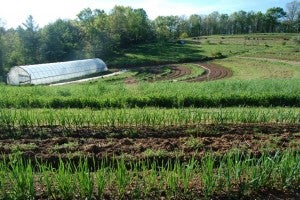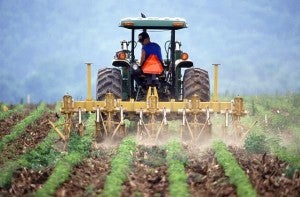Starting A Farm
Are you’re thinking about starting a farm? This guide is here to help you take the initial steps.
We provide an overview of the topic of starting a farm and point you toward the best information and resources to help you get started.
This guide is primarily oriented toward small farm operations.
The Quiz: Before we begin, are you wondering whether farming is the right career choice for you in the first place? Consider taking this little quiz produced by Taylor Reid, founder of beginningfarmers.org. It incorporates his experience of what it takes to be a successful farmer into a fun tool that gives you a score. While we cannot guarantee accuracy, the quiz has received a lot of positive feedback.
The Question: Lots of people write us at beginningfarmers.org excited about starting a farm, asking for advice. We wish we could reply and say: “no problem, just do these things and you should be on your way.” Unfortunately, it’s not that simple! So, we’ve compiled this resource to help you make your own informed decisions.
It’s Complicated! Starting a farm is complicated because it encompasses so much. In no particular order, farmers must consider business planning, finding land, securing financing, marketing, production knowledge, securing equipment, developing or securing infrastructure, and their vision for their farm, a product of their values, knowledge and experience.
What to Consider:
- Vision and Values: A farm is both an extension of the vision and values of the individual(s) who start(s) it, and it has to be carefully planned to make sure that it fits within that vision as well as within the particular confines of the place where it is established.
- Place Matters: Direct market farms typically aren’t well suited for the rural heartland, and rice farming is not going to be successful on the arid plains of Eastern Washington. These are extreme examples, but there are important subtleties to every market and every plot of land.
- Planning: New farms need to have a well designed business plan that takes into consideration individual infrastructure and financial needs, the viability of marketing strategies, and the farmer’s production capacity and knowledge.
- Education and Experience: Preparation, knowledge, and training are essential. But so is being able adapt quickly to the unexpected, to persevere when factors beyond one’s control conspire against you, and knowing how/when/what/where to expend time, energy, and resources.
- Managing risk: It is helpful to plan careful to manage risk through diversification, financial management, and the ability to withstand a couple of bad years.
- Start small: For most beginning farmers, we advise starting small to allow time for details to be worked out, for additional learning to occur, and to mitigate the size and scope of problems that will inevitably arise.
The above is offered here not to discourage, but to encourage careful, thoughtful planning before starting a farm.
The many links above suggest that starting a farm is a topic too large to be contained a single webpage, in a single resource. But this is a great place to start. And the resources listed below should help prospective farmers develop a viable farm plan, and assist existing farmers to scale up, diversify, or modify their operations.
Resource List
This list is not exhaustive, but it is extensive. While there is some overlap from resource to resource, there are important differences, some geographic, since many of the resources are created by state cooperative extension services or regional farm groups.
How to Begin Your Small Farm Dream is a SARE publication that discusses the risks and rewards of farming, how to make good decisions for your enterprise, and how to start the business planning process.
The Beginning Farmer Resource Guide from the Leopold Institute is an overview of production considerations and business planning concepts for beginning farmers.
Whole Farm Management: From Start-Up to Sustainability is a comprehensive guide developed by the Small Farms Program at Oregon State University to help aspiring and beginner farmers make smart business decisions to ensure lasting success.
The Family Farm Series Publications from the University of California Small Farms Program includes information on enterprise selection, how to finance a small farm, farm leases and rents, and how to determine your cost of production.
The Northeast Beginning Farmers Project from Cornell University has a great “Getting Started Guide.” Once you’ve used this guide, the “New Farmer Hub” offers additional resources to help you develop a farm plan.
Identifying New Enterprises: A Checklist of Factors to Consider is a guide to enterprise selection that will be helpful to beginning and experienced farmers alike. The guide was produced by IFAS Extension at the University of Florida.
Starting or Diversifying an Agricultural Business is a guide oriented toward small farms, produced by Penn State University.
Evaluating a Farming Enterprise produced by the National Sustainable Agriculture Coalition is one of their many guides for beginning farmers.
The New England Small Farm Institute has several useful publications on their Starting A Farm Page and their Enterprise Selection Page.
Primer for Selecting New Enterprises for Your Farm is produced by the University of Kentucky.
Small Farm Decision Making and Enterprise Planning Workbook is published by North Carolina Cooperative Extension.
New Farm Start-Up is a guide to starting and growing a small or medium sized farm business in British Columbia, produced by The British Columbia Ministry of Agriculture
Farm Planning and Enterprise Selection is a electronic slide show oriented toward Oregon farmers, based on materials from the New England Small Farm Institute and Cornell University.
Decision Making: Will You Start a New Enterprise? is helpful general decision-making guide, produced by the Government of Alberta Agriculture and Rural Development department.
Find more useful farming resources at https://www.beginningfarmers.org/additional-farming-resources/
© 2017 Carbon Media Group Agriculture




 Your Privacy Choices
Your Privacy Choices